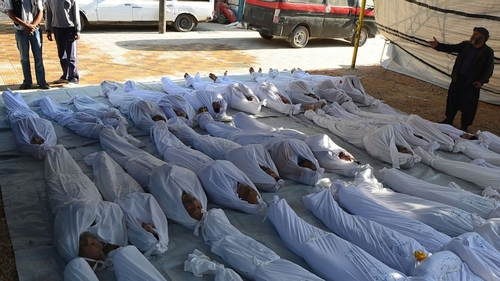The Somalization of Syria
Joyce Karam/Al Arabiya/September 10/15
When former U.N. Envoy to Syria Lakhdar Brahimi sounded the alarm in 2012 over the “Somalization of Syria”, he was shrugged off by the Assad regime and dismissed by some in the opposition. His warning, three years and many militias later, is materializing at a fast pace in Syria as both victory and a political solution seem out of sight. Very much like the overthrow of former Somali dictator Mohamed Siad Barre in 1991 after five years of conflict between his regime and the rebels, Somalia’s state of chaos and fragmentation compares in more than one way to the trajectory of the Syrian conflict. The lack of international interest in finding a long lasting solution for Syria and limiting any intervention to counterterrorism or regional security parallels with the case of Somalia and promises a long drawn-out conflict.
No winners and no breakthroughs
Despite the lofty talk of a political solution in Syria, expecting such an outcome in the near term is unrealistic and farfetched given the schism among internal and regional actors over the post-Assad power structure. Also, the speed at which the fragmentation is happening on the ground, and the gains that ISIS and Al-Qaeda’s affiliate Jabhat al-Nusra are making, have introduced new set of realities that torpedo the Geneva II framework. “Nothing is moving; everything is stuck,” U.N. Syria envoy Steffan de Mistura was quoted in al-Monitor telling an NGO analyst most recently. The recent Russian military escalation in Syria is one more nail in the political solution’s coffin. Even De Mistura’s effort at achieving a temporary ceasefire in an Aleppo suburb collapsed earlier this year.
Despite the humanitarian cost of more than 250,000 dead and millions displaced or crossing in despair to Europe, the Syrian regime is not at a point of seeking a major power-sharing compromise while the rebels are marred by divisions and competing agendas.
This reality is rendering many diplomats and negotiators hopeless, with some choosing to limit their goals to relief efforts and focus on preliminary local needs. Similar to the central government in Somalia, the Assad regime’s control is dwindling by the day and as the conflict takes a heavy toll on its military and reinforcements. Today, it is Iran and Hezbollah who are negotiating with the rebel group Ahrar Sham in Zabadani, and it’s Turkey who is vetting the rebels to deploy in its “safe zone” inside Syria. This is all whilst ISIS expands into Palmyra and fortifies its unchecked power in Raqqa.
On the opposition side, it is the more extreme groups such as Ahrar Sham, Jaish al-Islam and Jabhat al-Nusra who are gaining prominence while moderate groups such Harakat al-Hazm, cited once by U.S. Secretary of State John Kerry, has effectively dissolved. Rebel leaders who were also seen as moderate in Washington such as Riad Asaad or Salim Idriss or Jamal Maarouf were not able to withstand Jabhat al-Nusra and ISIS. Neither were the 60 trained fighters by the United States, who were either killed in the battle or got kidnapped by Nusra. The Syrian factions, however, face a similar reality to those in Somalia, where neither group including the regime has the power to achieve an outright military win, and are instead trapped in a war of attrition. As in Somalia, the battle lines constantly shift and gains and losses alternate between the regime and the rebels – with neither side the permanent victor or the vanquished.
Russian escalation and adjustment
The recent Russian military escalation in Syria is one more nail in the political solution’s coffin. Russia, very much like Turkey, the United States, Syria’s neighbors and Iran is adjusting itself to a long conflict in Syria, and trying to preserve its geopolitical interests on the Syrian coast through propping up the Assad regime. Syria, akin to its Somali counterpart, is gradually becoming a counterterrorism battlefield while substituting Harakat al-Shabaab with Nusra and ISIS. The international community seems to be adjusting to the humanitarian catastrophes through containment, and only intervening to strike ISIS or Al-Qaeda affiliates. On the other hand, the internal chaos and fragmentation ensued from the fighting is being left to play out.And it’s all at the expense of Syria’s future as a state with a functioning central government.
In Somalia and since 1986, more than half a million people have died while the international community kept its distance from intervening. In that conflict, only its neighbors Ethiopia and Kenya stepped in to secure their interests. This scenario is replaying in Syria, whereby the intervention is only understood in anti-ISIS terms, and regional actors such as Turkey and Israel have only intervened to achieve key goals against Hezbollah or the Kurdish groups. Iran and Hezbollah’s intervention meanwhile is focused on expanding Tehran’s role, and seeking new military presence near the Golan heights to threaten Israel. Without a peace deal, “Syria would be transformed to hell…what will happen is Somalization” predicted Brahimi in 2012. In 2015, Syria has made this transformation and its Somalization is happening before our own eyes – as geopolitics and counterterrorism define the global response.
Europe and the refugee crisis: Don’t blame the Syrians
Mohamed Chebarro/Al Arabiya/September 10/15
The Syrian refugees arriving en masse in Europe are just the tip of the iceberg – and a result of the international community’s human and ethical failure to deal with the ongoing conflict in Syria. Those beginning to arrive will grow in number and clearly beg for a new way to look at the Syrian conflict and other fires burning in the Middle East, North Africa and beyond. Whether rich or poor, Syrians inside the country or refugees in Lebanon, Jordan, Turkey or beyond seem to have lost hope and see no indication that the conflict in their country is likely to draw to a close soon. This is what is finally pushing Syrians to emigrate.
For the flow to stop, the international community must be more proactive in finding solutions to Syria’s forgotten wars. Russia, for example, can no longer supply Assad with hardware to kill his people. Recently the Kremlin seems to be bolstering Assad’s military again under the loose banner of fighting extremism. Iran too must not fund, arm and supply Iranian advisers and militias from Iraq, Afghanistan and elsewhere to prop up its dream of a Shiite crescent led by the Islamic republic’s Supreme Leader Ayatollah Ali Khamenei.
Old tactics
The Supreme Leader’s dream should be to export or import an economic solution to reboot its ailing economy and status of his nation. Iran is a country with limitless potential, but is still enveloped in yesterday’s power posturing and 36-year-old revolutionary values. Europe should put aside its internal differences and work together to push forward the international community to act on Syria The U.S. under President Obama can no longer bury its head in the sand and ignore the fire of the Syrian crisis spreading.
It seems that only Obama forgot that the U.S. is still a super power. Yet the nation is still a symbolic world leader capable of upholding the ethos and values that echo with most people inside the U.S. and the wider world. Yes oppressed people from around the world still look up to the Western world for salvation and not to Russia or China. The Obama administration could no longer view the crisis from the prism of fighting extremists that spring out by design and default of letting the conflict simmer in Syria.
Closer to Syria, the Turks could not have a two-way tango: one with ISIS and another against the Kurds. The Arab nations who opposed Assad and encouraged and funded the rebels should also be more proactive at supporting the Syrian diaspora and in playing all the diplomatic cards available to them. They should push the Syrian opposition to unite and present themselves as a viable option for leading a post-Assad Syria.
Hard solution
Europe should put aside its internal differences and work together to push forward the international community to act on Syria. European nations must round off or put aside differences between the Russians and the Americans and push them harder to solve the crisis for a more peaceful world that their people, economy, and values have long upheld. It would not be fair to say that Europe has finally noticed that there was a conflict in Syria. They have been supporters of a speedy resolution of the crisis since day one – and they saw this would be made possible through a quick departure of Assad and his cronies.
Nor did Europe just realize that they must double their efforts to make sure that crisis around the world must be contained before spreading and going out of control. European countries experienced a huge influx of refugees in the 1990s due to the Bosnian war and later the Kosovo conflict. To them that was a European problem on their continent. They never believed that the stalemate in Syria and the many proxy wars fought that far from Europe could spill to Europe’s shores.
Warm welcome
Today, towns and citizens in the heart of Europe who had never heard of Syria are expected to welcome Syrians in the tens of thousands and offer them asylum. They need to be praised regardless of how many refugees they welcome. After nearly 5 years of war, with more than quarter of a million killed and another estimated one million injured, imprisoned, tortured and missing, half the Syrian population of over 23 million is on the run. Even those who are not in the line of fire are packing up and heading out in search of a better future and one cannot blame them. With millions scattered inside Syria, and millions of refugees in Lebanon, Jordan, Turkey and elsewhere, Syrians are also human beings searching to line up a better future for their children. Increasingly the world seem to be failing them and their forced exile is likely to be both be extended and very long.





















